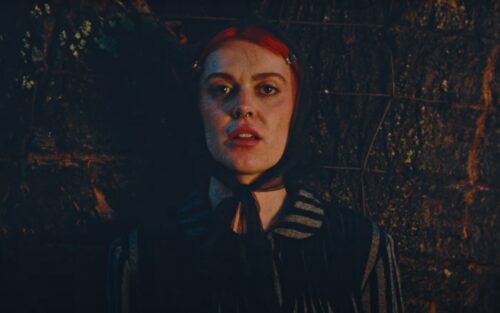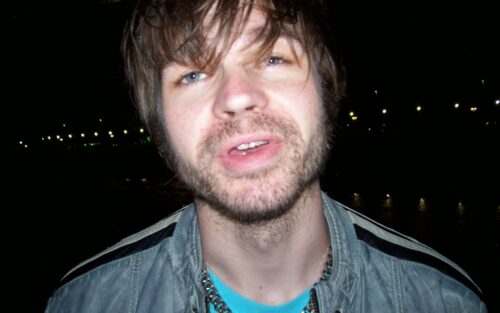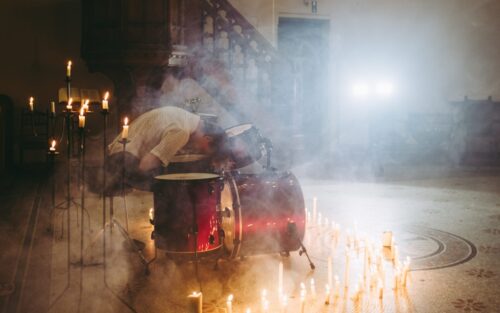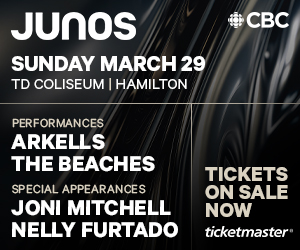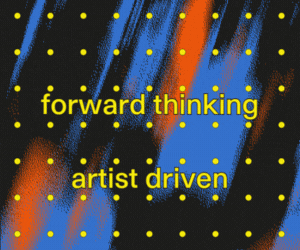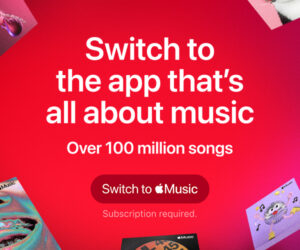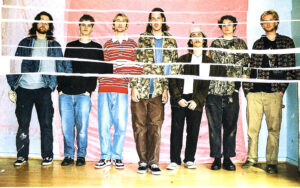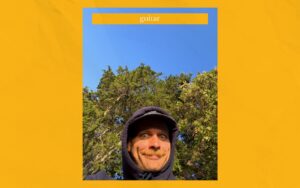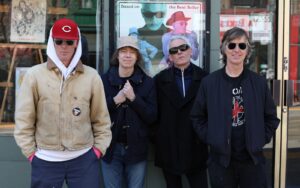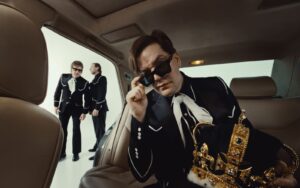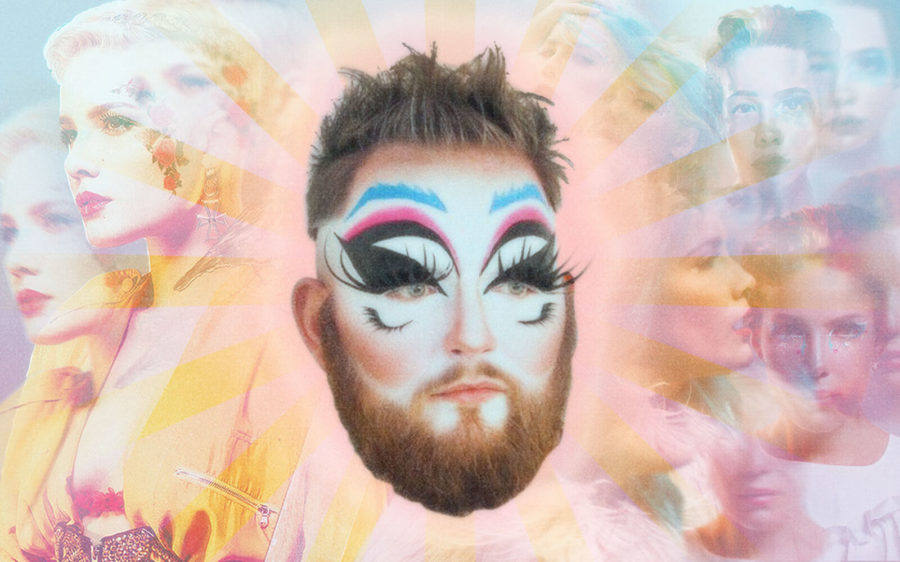
The Evolution Of Halsey According To Dust
A drag artist’s rumination on love, power, and sexuality in pop music.
by Dust Cwaine (David Cutting)
Photo illustration by Erik Grice
- Published on
It’s the year 2021; the year of houseplants, bedroom singers becoming pop sensations, TikTok bringing back sea shanties, and of course another Halsey album. If we have anything at all to be grateful for during this era of COVID-19, it’s that all those cancelled tours freed up time for artists to create new albums. And so now, just a year and change after her last album, Halsey is back with another studio outing: If I Can’t Have Love, I Want Power. This time is different though, as she has teamed up with Trent Reznor and Atticus Ross — but more on that in a minute.
Unapologetic and armed with sharp words, Halsey is unrelenting in her demand for presence in the music industry; an open bisexual, biracial, and bipolar woman who shares her queerness with almost reckless force. One might even venture to say her efforts on visibility are heroic. Her humble beginnings singing Blink-182 covers in a mall certainly lend itself to her now legions of fans who have found themselves in her identity driven music. A product of the internet does not make her immune to the misogyny she swims against as an outspoken woman in music, fighting hard for every earned accolade.
As I hit play on her fourth LP, If I Can’t Have Love, I Want Power, I wanted to take some time to give a thorough retrospective on Halsey’s career up to this point. Her legacy is vast and it’s all built on her baring her soul, so let’s get into it.
Badlands (2015)
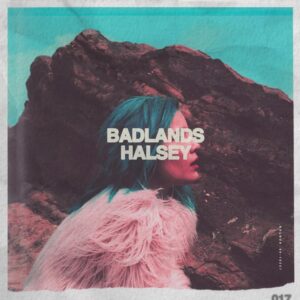
Badlands is the perfect time capsule for music in 2015. It captures much of the moody sonic drone that we got to indulge in that year. A concept album as a first outing makes sense, especially for a diva born of the internet. Armed with lyrics that are distinct and emotive, Badlands ushers us into Halsey’s inner world, a place where Tumblr comes to life as a personal but not too personal diary.
The young singer is careful how much of herself she discloses, hiding much of herself behind the fictional dystopian setting of the album about a warrior making their way through the badlands. However, the nuances of the lyrics are personal, exploring her inner world through this character of great strength. Badlands serves as a safe place for Halsey. A playground to set the tone for what her massive career will become.
Hopeless Fountain Kingdom (2017)
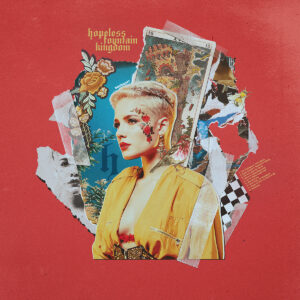
Hopeless Fountain Kingdom does what Badlands couldn’t; finding honesty and placing Halsey as the anti-hero of her own story. It captures an honest and raw nature. Sonically this album is once more a product of the music popular at the time. It lives at the cross-section where decades overlap. The fizzle-fade between the 70s and 80s and the sharp moan of the 80s into the 90s. The first track, aptly called “The Prologue,” is her thesis statement against the capitalist institution that is the United States. Placing angst inside a world problem isn’t groundbreaking by any means but she sets a hopeless tone, digging deeper into more conventional pop sounds. Much like Badlands, HFK is a loosely based concept album around Romeo and Juliet that asks,“What if Romeo never went for Juliette?” It’s a unique way to explore herself through a non-threatening fictional narrative, but mark my words, it doesn’t make it any less personal.
Hopeless Fountain Kingdom is unabashedly queer. I might even venture to say it is daring in its brashness. This is the album where Halsey puts her bisexual, biracial, and bipolar themes at the forefront, creating a deeply relatable throughline for her fans. Often in music we find queer artists avoiding pronouns or even the terms “boy” and girl” to help make a queer song a little more palatable for the straighter audiences. Halsey refuses to mince words. “Bad At Love” wastes no time establishing Halsey’s half Sapphic self, as she makes it abundantly clear that she has no desire to succumb to a hetero normative lifestyle.
Manic (2020)
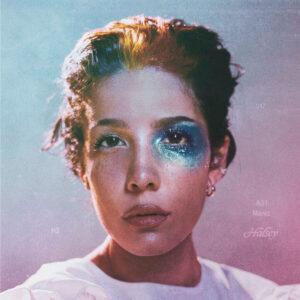
Manic, Halsey’s third album, was released on the cusp of the pandemic. Deepening themes around mental health and trying on different genre styles, the album sets itself apart by fusing elements of country music with hip-hop and K-Pop with a splash of electro, making this album live up to its name — Manic.
My favourite part about this album is that Halsey brings Alanis Morissette in for a feature on a track called “Alanis’ Interlude.” It’s solely about Halsey’s first time being with another woman and my gay heart exploded when I first heard it. As a queer person who grew up with Jagged Little Pill — much like Halsey did — I can tell you what it would mean to have Alanis validate and uplift my sexuality. The coding in this album alone is what Halsey wanted to capture here. It’s both clever and genuine — the ultimate flex.
If I Can’t Have Love, I Want Power (2021)

If I Can’t Have Love, I Want Power starts with a very pointed look at the perils of holding on to tradition in a world evolving in brilliant innovations. It feels subtly violent and covertly angry, but also mature. Each song captures an early-aughts tone that is slightly built upon, showing maturation. Halsey’s voice over grunge rock instrumentation creates a beautiful tense juxtaposition.
She tries on the character of Lilith to express her deeper angst as she matures and screams her way into motherhood. Lilith, the first wife of Adam before Eve, is a metaphor Halsey throws at us so we don’t forget that she is transforming into whatever the hell she wants. Our expectations are not something she even factored into the creation of this album. The song “Honey” plays like a pop-punk song from 2004 pulled from a secret vault.
My most favourite aspect of this album is the breaths in the vocal tracks. It feels deliberate, purposeful, and intimate. This album serves as Halsey’s deepest evolutionary process. It has a subtle joy, like she finally did the thing she always wanted to do. I think we have her collaborators to thank for this, Trent Reznor and Atticus Reed are probably folks who Halsey has admired her whole life and their work has clearly helped her confidence. If I Can’t Have Love feels triumphant. For a woman who has bared it all her entire career, it is deserved. And as the album comes to a close, she leaves the door open; for us, for her, and for her beloved newborn.
By Stephan Boissonneault
Nate Amos revisits a decade of stray ideas and turns them into his most compelling record yet.
By Khagan Aslanov
Mike Wallace’s electro-punk project premieres the hypnotic, percussion-driven video for "Certain Days."

